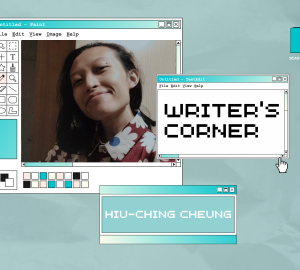The Writer’s Corner features poetry, essays, short stories, satire and various fiction and non-fiction from SCAD Atlanta students. To submit your own work for the Writer’s Corner, email features@scadconnector.com.

‘On Crying: Let It All Out’ by Marian Hill
Head in my hands, I sit at the edge of my bed. I can feel in my eyes a stinging sensation that I’ve become more familiar with over the past few months. The experience has stolen all the energy in my body. The tears still burn hot on my face, my throat aches from the screaming, and my head is pounding. I’ve survived another crying fit. As a child, crying with every ounce of emotion inside me was more acceptable. But I’ve entered my twenties, and I’m still throwing myself onto my bed in dramatic fashion, crying my heart out.
Crying is– among the many natural human reactions– something that we often have trouble accepting. In comparison to other bodily functions, it’s one of the less repulsive. But still, we contain it to ourselves as if it is just as embarrassing as flatulence. It has such great social stigma that we are judged for it. People like to think that the stigma has to do with gender in some way, but at the end of the day we are all given hell for it. If a woman cries, she’s overemotional, and if she doesn’t, she’s cold-hearted. If a man cries, he’s a wimp, and if he doesn’t, he’s detached. It’s a form of communication that we deny ourselves of because we see it as a confession of weakness. When we cry, we are visually and audibly admitting to everyone around us that we are overcome by our emotions and cannot handle it. So, we cry out of sight.
But there is something sacred in watching another human cry. In that moment, they felt something that they could not control, and they were pushed to the limit. Crying is an autopilot reaction. Crying is a violent overtake of emotions. When you watch someone cry you’ve become witness to them succumbing to their body’s desire to get rid of the burden. Fed up with being denied the release it needs, the body takes over. They begin to cry. They weep, they sob, they ball, and they wail. They choke up, the first gasp is stuck in their throat, and when it’s let out in a loud breath so comes the flow of hot saltwater streaming down their face.
I once heard from a friend that tears were good for the complexion. Something about the salt compound in the tears helps to rejuvenate the pores. Instead of wiping away my tears, I rub them into my skin. And I’ve started to see that if I emotionally breakdown more, my skin breakouts less. Even if having good skin and crying a lot are not scientifically correlated, the act of washing my face with my own tears has become therapeutic. I’ve become appreciative of crying for a reason outside of the emotional catharsis it brings me. The pseudoscience of the tear facial encourages me to cry harder, louder, and push out every last drop that I can.
There is a plethora of ways to cry, from the most theatrical of wailers to the single, unnoticeable tear of the shy weepers. There are those who only use tears. Nothing of their crying can be heard, but the wet streams that stain their cheeks say it all. There are those who dry cry. Their sobs are trumpeted, but somehow their face is void of tears. There are those who begin with a laugh. The sound of jovial giggles transforms in tone, becoming deeper and longer. The friend that was at one moment laughing at your joke is now sobbing. I’m the kind of crier who screams and shouts at the top of her lungs (if a pillow is available to me, I yell into that). I uncontrollably sob like a madwoman, and I love it. I absolutely love to cry. I’ve let everything out, so what else is left? Nothing, and I find comfort in that. I’ve let my body do its thing, and now I can get on with my life.
Humans need to relearn what crying is. It’s a physical release of emotion, and the body craves it. It is more exhausting holding it back than it is to let it out. Cry when you are happy, cry when you are sad, and cry when you stub your toe on the coffee table in the living room because that is truly painful. When we cry, we are a very truthful version of ourselves that has waited to be heard. Continuing this fear of crying will only cause our kind to become less understanding of our own emotions. But there is a chance that we will change when we start to realize that we are more human when we cry.


























